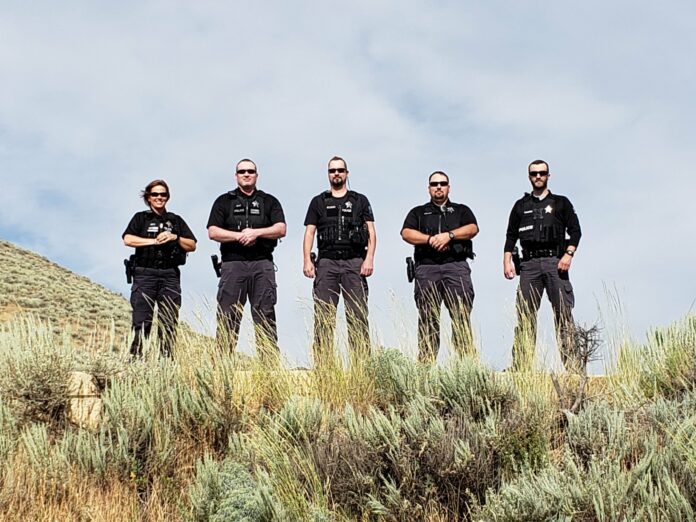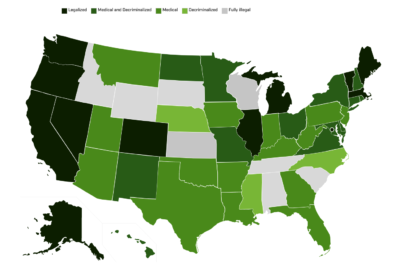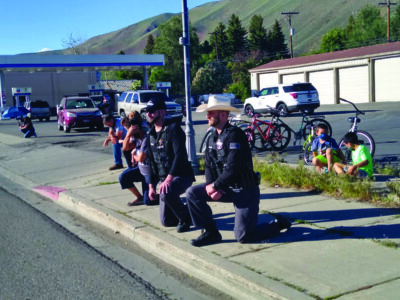
Drug arrest is stoking questions about hemp, marijuana legalization
By Eric Valentine

If Bellevue Marshal William “Ross” Scaggs delivered a marijuana product in three Idaho-bordering states, he’d be called a friend. But since he did it in the Gem State, he’s being called a felon—allegedly, of course.
Scaggs was arrested Oct. 13 on felony possession of marijuana with intent to deliver, following a tip alledging Bellevue’s lead law enforcement officer delivered a marijuana product while on duty and an investigation carried out by the Blaine County Sheriff’s Office and Prosecutor’s Office.
“As an agency, we are shocked and horrified by the charges. The absolute breach of the public trust that has taken place is atrocious to us. As a department, we will be working to repair the trust and respect for the citizens. Ross Scaggs has been placed on administrative leave. Assistant Chief Mynde Heil is the Interim marshal. As a department, we are cooperating with the appropriate agencies,” a public statement by the Bellevue Marshal’s Office said.
The disparity between marijuana laws across the country and the general popularity of Scaggs, who was unanimously appointed as head marshal by the Bellevue City Council in 2017, has some folks asking if it’s time to take a hard look at Idaho law when it comes to hemp and marijuana. However, the tenuous relationship, in general right now, between law enforcement and regular citizens also has people reeling from what they describe as the hypocrisy of it all. A recent post over the Scaggs arrest in a local Facebook group garnered 137 comments and counting in recent days. And opinions are all over the map, as varied as marijuana laws from state to state.
A comment by Valley resident Mattie Mead managed to summarize both ends of the opinion spectrum.
“What perturbs me more than the fact that a Bellevue (marshal) was in possession of marijuana, is the question of how many folks have been arrested and subsequently prosecuted for possession of marijuana under Officer (Scaggs’) leadership as well as directly by Officer Scaggs. Perhaps a good place to begin rebuilding public trust would be to investigate who has been prosecuted or who is awaiting trial for minor marijuana offenses and nullify those offenses.”
It’s the economy, stupid

The general consensus, even in the national perspective, is that if Idaho ever legalizes marijuana, it’s not going to be happening anytime soon. Some pundits point to the conservative and Mormon influence on politics here. But that doesn’t mesh with the fact that the state of Utah, the headquarters of the Church of Jesus Christ of Latter-day Saints, is one of 15 U.S. states that has legalized medical marijuana. And neighboring Montana, which is firmly-in-the-red (politically), also has legalized marijuana for medicinal purposes.
Incidentally, the legalization of at least hemp is now being talked about in election debates. At a recent event where incumbent State Senator Michelle Stennett squared off with Eric Parker, the challenger expressed his dismay about Idaho’s hemp laws.
Parker promoted the need for a bill at the state level that would allow for hemp to become a viable industry in Idaho.
“It drives me nuts we can’t get a hemp bill in an ag state,” Parker said.
Parker’s idea is not unprecedented. Late last year, the Idaho Statesman newspaper penned an editorial calling for the state Legislature to take up the issue after three separate truck drivers were arrested for transporting hemp through Idaho. State law doesn’t differentiate between marijuana and hemp, so in the state machine’s eyes, anything containing THC is a felony.
All three drivers, ultimately, were allowed by the court to reduce their charge and avoid harsh sentencing.
“Now it’s the Legislature’s turn to exercise some good judgment,” the Statesman editorial said.
The 411 on the 420

The data on legalized marijuana and crime rates is a mixed bag. And, although much of the data shows crime rate reductions, it’s easy to cherry pick statistics and to inadvertently compare apples to oranges. Perhaps the most difficult part of the data collection is that crimes are not clean. That is, if someone commits a crime while on marijuana but was also drinking alcohol, was it a factor at all in that crime? Sans alcohol, one may even hear the old joke: A bunch of guys drinking too much alcohol is one step away from becoming a violent gang fight; a bunch of guys smoking too much pot is one step away from becoming a video game night.
So, a better way to determine the impact of illegal marijuana is to calculate how much time and money is spent prosecuting and punishing its use, compared to so-called harder drugs that large portions of the population are not clamoring for them being legalized, such as methamphetamine.
A report by the Idaho State Police and the Idaho Statistical Analysis Center shows that between the years 2006 and 2013, 38,845 cases involving marijuana were started in the state. For meth, that number is only 12,440. But what does that mean? For one thing, it means marijuana is far more widespread, for better or worse. It also means that resources, from law enforcement to the courts, the jails and the prisons, get impacted moreso by a drug some states have recognized as medicinal, at best, and like having a couple glasses of wine, at worst, than a drug that is illegal in every single state in America.


